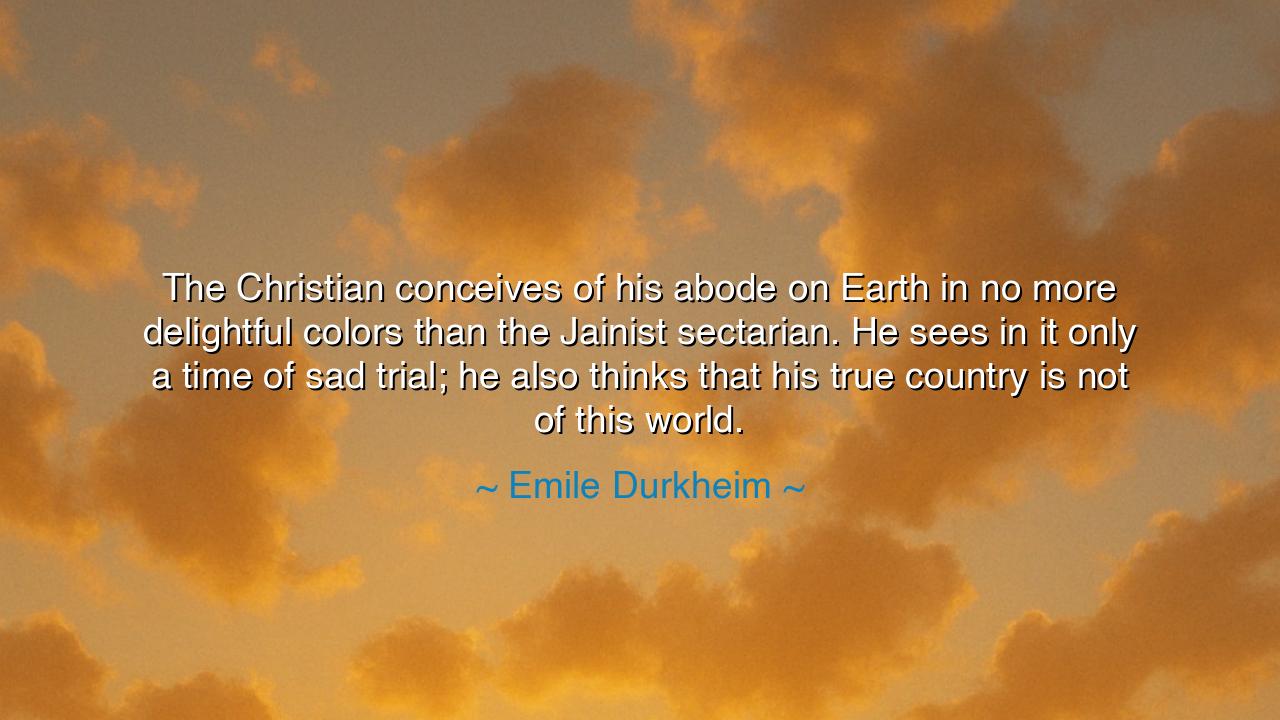
The Christian conceives of his abode on Earth in no more
The Christian conceives of his abode on Earth in no more delightful colors than the Jainist sectarian. He sees in it only a time of sad trial; he also thinks that his true country is not of this world.






Émile Durkheim, the great thinker of societies, once wrote with penetrating clarity: “The Christian conceives of his abode on Earth in no more delightful colors than the Jainist sectarian. He sees in it only a time of sad trial; he also thinks that his true country is not of this world.” In these lines he revealed an ancient current of human faith: the conviction that this life is not final, that the world in which we dwell is but a passageway, and that the soul’s true home lies beyond.
The heart of his words lies in the notion of Earth as a place of impermanence. To the Christian, life is not paradise but pilgrimage, filled with burden and temptation, yet endured for the promise of heaven. To the Jainist, life is a snare of karma and suffering, a trial to be escaped through discipline and renunciation. Though born in different lands, these faiths echo one another: they see this world as a sad trial, not the destination but the testing ground. Durkheim’s wisdom is that across cultures, human beings have often shared this vision—of being strangers here, travelers to a greater realm.
History bears witness to this truth. The early Christians in Rome, persecuted and reviled, endured tortures with courage because they believed their true country was in heaven. Martyrs entered the arena singing, not because they despised life, but because they held that the trials of Earth were fleeting compared to eternal reward. In distant India, the Jainists, through fasting and asceticism, declared a similar truth: that to free oneself from the bonds of the world was to awaken to one’s true home, beyond flesh and suffering. In these stories, we see the same flame burning in different lamps.
Durkheim, the sociologist, did not speak as a preacher, but as an observer of mankind. He recognized that the human spirit, when faced with the burdens of mortality, often seeks refuge in the idea of another world, higher and purer than this one. To call Earth a sad trial is not to despise it, but to interpret its sorrows as part of a greater journey. It is to live with the conviction that pain has meaning, because it prepares the soul for something greater.
The deeper meaning, then, is about orientation. To believe that one’s true country is not of this world is to resist despair in the face of suffering. It gives strength to endure injustice, persecution, and hardship, because the believer holds that no earthly power can rob them of their eternal inheritance. This belief has been both a comfort to the oppressed and a challenge to the rulers of every age, for it produces a people who are not wholly bound by worldly fear.
But there is a caution too. To see this world only as a trial can lead some to neglect its duties—to turn away from justice, mercy, and beauty here and now, waiting instead for another life. The balance lies in recognizing Earth as both a trial and a sacred trust. The Christian is called to love neighbor, the Jainist to harm no living being, even while both look beyond this life. Thus the lesson is not to despise the Earth, but to live upon it faithfully, knowing it is not the final home but still a holy ground entrusted to our care.
For us, the teaching is clear: do not cling to this world as though it were eternal, nor despair when it proves sorrowful. Remember that every culture, from the catacombs of Christians to the ascetic groves of Jains, has told the same truth—that we are travelers. Live, then, as a pilgrim: endure trials with patience, walk in compassion, and remember that the soul’s journey does not end with the grave.
Thus Durkheim’s words echo like a voice from the ancients: this Earth is not our final country. It is but the field of testing, the road of becoming, the place where our courage and our love are revealed. Beyond it lies the homeland for which the soul was made, and toward which it walks with every step of faith.






AAdministratorAdministrator
Welcome, honored guests. Please leave a comment, we will respond soon